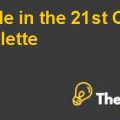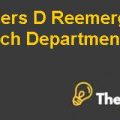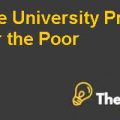Financial Policy At Apple Incorporation Case Study Solution
Effect of Operational Performance on the Decreased Stock Price
The decline of 37 percent in the stock price of Apple Incorporation started from September 2012 till March 2013 due to the fact that the company lacked in the introduction and implementation of innovative ideas regarding new product offering, and further lacked in finding the opportunity to invest in future innovative projects. Moreover, the company suffered to come up with the innovative ideas after Steve Jobs passed away. Hence, the lack of ideas and undiscovered investment opportunity resulted in the hoarding of large amount of cash in the balance sheet of the company. Moreover, the pileup of cash in the balance sheet of the company raised a concern for the shareholders of the company that why the company was not utilizing this cash in the form of investments or by giving dividends to the shareholders. Thus, the shareholders and investors perceived that the increase in cash hoarding provided an indication that the company lacks innovative ideas to invest in, therefore future prospects of the company would not be profitable if the same products were featured by the company.
Apple’s Excess Cash
Why Does Apple Holds so Much Cash
Due to worldwide acceptance of the products of Apple Incorporation and achievement of operational efficiency by the company, which resulted in increased net income of the company. Furthermore, the increased net income of the company within the period of 2000 to 2012 resulted in an increase in retained earnings by the company, which resulted in huge pileup of cash in the balance sheet of the company. Moreover, Apple Incorporation also lagged behind in initiating new ideas and opportunity for investment, which resulted in the hoarding of cash by the company. The company also did not pay any dividend since 1995, and focused on reinvestment of cash possessed by the company, but due to lack of ideas in investment opportunity, Apple Incorporation was compelled to hold such large amount of cash.
Amount of Excess Cash
The amount of excessive cash that was possessed by the company, was $137 billion.
Cash after Five Years if All the Cash is distributed in 2012
If all the cash was distributed by the Apple Incorporation in 2012 to its shareholder, the excess cash that would be available to the company by the end of 2017 would be about $57 billion.The value of $57 billion is derived by assuming the compound annual growth rate of the cash for the period of 2000 to 2012.
Dividends by Apple Incorporation
If the company choose to distribute dividend for each year in the period of 2012 to 2017, the company could afford to pay $129 per share in the year 2012, because of the huge pile up of excessive cash on the balance sheet of the company. In the year 2013, 2014, 2015, 2016 and 2017, the company could afford to pay $55, $59, $60, $61 and $61, respectively. Hence, the dividend for each year is determined through dividing the number of outstanding shares of the company with the excess cash available to the company.
Comparison of Dividends, Share Repurchases and Issue of Preferred shares
If the company chooses to distribute the entire cash in dividends, the company would be able to afford to pay approximately $129 per share. If the company chooses to re-purchase the share from the excess cash, the company would be able to purchase 203 million shares of the company, which will eventually increase the earnings per share of the company. Furthermore, if the company chooses to issue preferred shares i.e. 5 preferred share for each common share outstanding, the company can issue 4.695 billion shares, which will cost $9.391 billion to the company. Furthermore, if the company issues preferred shares, the excess cash of the company would remain within the company, and the share value of the company will also increase due to the annual preferred dividend of $2, and the company would be able to utilize the excess cash flows for the future projects or any occurrence of uncertainty. Hence, it is found through the comparison that the best option available to the company would be the issuance of preferred stock,which will enhance the value of the shares of the company, and enable the company to resolve the repatriation issue for taxes since the free cash flow of the company would be used for the purpose of preferred shares.
What Should Cook and Oppenheimer do
To increase the value of the shareholders and the company, Tim Cook and Oppenheimer should focus on formulating a strategy of providing the excess cash to the shareholders, and formulating an investment plan by finding an opportunity and deriving an innovative plan for the product development to cope up with the expectations of the customers regarding the brand that Apple Corporation was focused on, in providing innovative and value creation products for the customers. Therefore, to retain the value of the company; the best option available to Cook and Oppenheimer is to either come up with the investment plan in order to utilize the excess cash flow retained by the company or issue preferred share of the company if the company is not able to find a feasible investment plan that can be invested through the excess cash retained by the company.............
This is just a sample partical work. Please place the order on the website to get your own originally done case solution.










